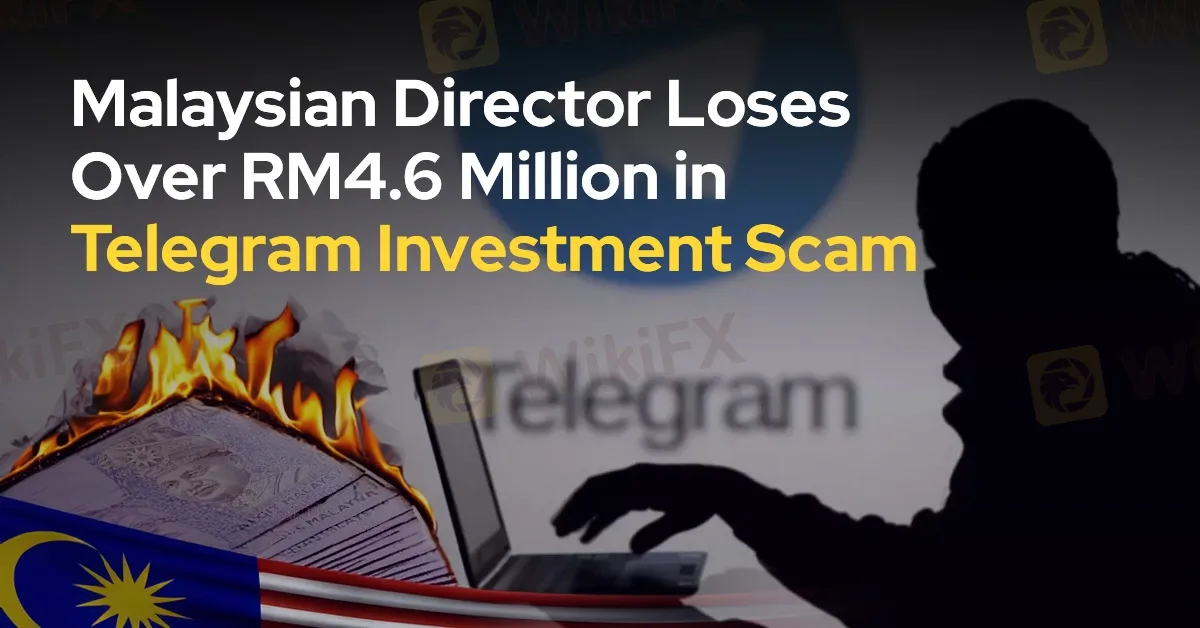简体中文
繁體中文
English
Pусский
日本語
ภาษาไทย
Tiếng Việt
Bahasa Indonesia
Español
हिन्दी
Filippiiniläinen
Français
Deutsch
Português
Türkçe
한국어
العربية
Malaysian Director Loses Over RM4.6 Million in Telegram Investment Scam
Abstract:A 49-year-old company director in Malaysia has fallen victim to a fraudulent investment scheme, losing RM4,613,300 of his hard-earned savings.

A 49-year-old company director in Malaysia has fallen victim to a fraudulent investment scheme, losing RM4,613,300 of his hard-earned savings. This unfortunate incident underscores the growing prevalence of online investment scams, which continue to target individuals and businesses alike.
According to Dato‘ Seri Ramli, Director of Bukit Aman’s Commercial Crime Investigation Department, the victim was lured into the scam through the instant messaging platform Telegram. On December 7, 2022, he came across an advertisement that promoted a high-return, short-term investment plan. The ad claimed to offer substantial profits with minimal risk, a common tactic used by scammers to prey on unsuspecting investors.
The fraudsters behind the scheme portrayed themselves as representatives of a U.S.-based company, offering what appeared to be a legitimate opportunity. They even claimed that the investment plan was backed by a USD 5 million security deposit. As part of their deception, they assured the victim that if the investment did not perform as expected, they would provide full compensation for any losses incurred. This false sense of security likely contributed to the victims decision to invest.

“The fraudsters convinced the victim that by investing USD 1 million, he would receive USD 2.9 million in both principal and profits within a year,” Ramli explained during a press conference. Believing the promises, the victim proceeded to transfer the funds from his company account into an overseas bank account, fully trusting that the scheme was legitimate.
It was not until July 9, 2023, that the victim realized something was amiss. After repeatedly trying to withdraw his investment returns without success, it became clear that he had been scammed. He immediately filed a police report, prompting an investigation under Section 420 of the Penal Code, which addresses cheating and dishonestly inducing the delivery of property.
Ramli also highlighted the alarming rise of such fraudulent schemes. In the first seven months of 2023 alone, Malaysian police received 3,863 reports of investment scams, with total losses exceeding RM408 million. Telegram, the platform through which the victim was duped, has emerged as a popular avenue for these scams, accounting for 1,346 cases. Facebook and WhatsApp followed closely, with 948 and 873 reported cases, respectively.
These statistics underscore the need for increased vigilance when dealing with online investment opportunities. Potential investors are urged to thoroughly research any offers and platforms before committing funds and to remain wary of promises of guaranteed profits or unusually high returns.

Disclaimer:
The views in this article only represent the author's personal views, and do not constitute investment advice on this platform. This platform does not guarantee the accuracy, completeness and timeliness of the information in the article, and will not be liable for any loss caused by the use of or reliance on the information in the article.
Read more

Elon Musk Sparks Debate Over Presidential Power and Federal Reserve Independence
Elon Musk has voiced his support for the controversial idea that United States presidents should have a role in shaping Federal Reserve policies. This endorsement aligns with recent remarks from President-elect Donald Trump, who has hinted at revisiting the central bank's independence, a long-held tradition in the nation's financial governance.

Consob Sounds Alarm: WhatsApp & Telegram Users Vulnerable to Investment Scams
Italy's financial regulator, Consob, has raised alarms over an increase in fraudulent schemes targeting investors through mobile messaging platforms such as WhatsApp and Telegram.

Crypto 101: Coins vs Tokens
For those new to the world of cryptocurrency, terms like "coin" and "token" may seem interchangeable. However, understanding the distinction between these two digital assets is crucial for navigating the crypto landscape. Both coins and tokens serve as integral components of blockchain ecosystems, yet they differ in their functionalities, use cases, and the technologies underpinning them.

DFSA Warns of Fake Loan Approval Scam Using Its Logo
The DFSA warns the public of a fraudulent loan approval letter featuring its logo, aimed at scamming individuals into paying a fake loan fee.
WikiFX Broker
Latest News
Tokyo Police Arrest 4 for Unregistered FX Trading Scheme
BSP Shuts Down Uno Forex Over Serious AML Violations
ACY Securities Expands Global Footprint with South Africa Acquisition
Rupee gains against Euro
WikiEXPO Global Expert Interview: The Future of Financial Regulation and Compliance
DFSA Warns of Fake Loan Approval Scam Using Its Logo
Consob Sounds Alarm: WhatsApp & Telegram Users Vulnerable to Investment Scams
CySEC Revokes UFX Broker Licence as Reliantco Halts Global Operations
Bitcoin ETF Options Get Closer to Reality with CFTC Clarification
Peso Depreciation to 59:$1 Likely Amid Strong Dollar Surge
Currency Calculator


